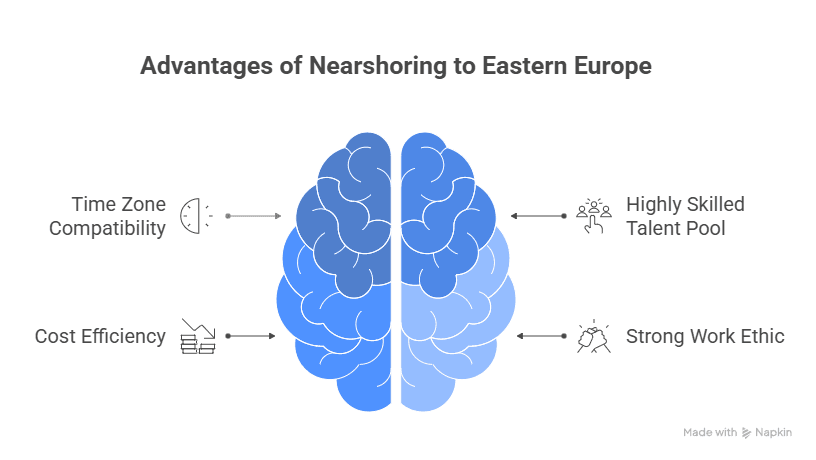As the global economy evolves, Eastern Europe has emerged as a strategic region for U.S. companies seeking to expand their workforce through nearshoring and remote hiring. Countries such as Poland, Romania, Hungary, and the Baltic states offer a compelling combination of highly skilled talent, cost-effective labor, and cultural traits that align well with Western business practices. However, succeeding in this region requires a nuanced understanding of its unique business culture, operational environment, and geopolitical context.
This guide explores the key cultural characteristics of Eastern European business environments, highlights the advantages and challenges of nearshore collaboration.
Economic Outlook and Business Environment in Eastern Europe
The Central and Eastern European (CEE) region is gaining increasing economic significance. A 2025 survey by KPMG, focusing on German companies active in the region, reveals that 55% of respondents expect Eastern Europe to grow in economic relevance by 2030. Furthermore, 42% plan to invest within the next year, and 56% within five years. Poland and Romania are consistently cited as preferred investment destinations.
The region’s economic growth is bolstered by increasing foreign direct investment, EU funding, and a burgeoning tech ecosystem. This environment creates fertile ground for U.S. firms looking to build nearshore teams with access to emerging markets and innovation hubs.
Core Business Culture Traits in Eastern Europe
Understanding the cultural fabric of Eastern Europe is essential for effective collaboration. While there are country-specific nuances, several shared traits define business culture across the region:
Formality and Respect for Hierarchy
Eastern European business culture tends to be formal and hierarchical. Titles and professional designations are important and should be used respectfully in communication. Senior leaders typically make key decisions, and deference to authority is expected, especially in traditional industries and government sectors.
For U.S. companies accustomed to flatter organizational structures, this may require adjustment. Recognizing and respecting hierarchy fosters trust and smooths interactions.
Punctuality and Professionalism
Punctuality is a sign of respect and professionalism. Meetings are expected to start on time, and being well-prepared is critical. This contrasts with some other global regions where time flexibility is more common.
Relationship Building and Trust
Building trust in Eastern Europe is a gradual process. Personal relationships underpin business partnerships, and reliability is highly valued. U.S. firms should invest time in nurturing relationships through consistent communication and follow-through.
Communication Style
Communication is generally indirect and diplomatic. Eastern Europeans tend to avoid public confrontation or blunt criticism, preferring tactful and nuanced exchanges. This contrasts with the more direct style common in the U.S. and requires sensitivity to implicit messages and non-verbal cues.
Risk Aversion and Bureaucracy
Decision-making often reflects a cautious, risk-averse approach. Thorough planning and adherence to procedures are common. Navigating bureaucracy can be time-consuming, requiring patience and local expertise.
Why Eastern Europe Is a Smart Nearshore Choice

Time Zone Compatibility
Eastern Europe’s time zone (UTC+1 to UTC+3) provides a significant advantage for U.S. companies, especially those on Eastern Time (UTC-5). This results in 6 to 9 hours of overlap, ideal for real-time collaboration. For example, a 9:00 AM meeting in New York corresponds to 3:00 PM in Warsaw, allowing for synchronous communication during critical work hours.
This overlap contrasts with offshoring to Asia or other distant regions, where time differences can hinder responsiveness and slow project timelines.
Highly Skilled Talent Pool
Eastern Europe is renowned for its strong educational systems, particularly in STEM fields. Countries like Poland and Belarus consistently produce top-tier software engineers, data scientists, and digital marketing professionals. Belarusian developers, for example, regularly rank among the world’s best programmers in international competitions.
This talent pool extends beyond tech to include sales, marketing, and customer support roles, all critical for building comprehensive nearshore teams.
Cost Efficiency
Labor costs in Eastern Europe are typically 30–70% lower than in the U.S., depending on the country and role. This cost advantage enables companies to scale teams affordably without sacrificing quality. For many U.S. firms, nearshoring to Eastern Europe strikes the perfect balance between cost savings and operational efficiency.
Strong Work Ethic
Eastern European professionals are known for their punctuality, dedication, and respect for authority. These traits align well with U.S. business expectations, fostering accountability and high performance.
Political Risk and Remote Work in Eastern Europe
The ongoing conflict between Ukraine and Russia remains a significant geopolitical factor in the region. While the situation is complex and fluid, it is important to note that remote work roles are generally less affected by physical disruptions compared to onsite operations.
In 2025, U.S. diplomatic efforts focus on reducing tensions while supporting Ukraine’s sovereignty. For remote teams, potential risks may include regulatory changes or intermittent infrastructure challenges, but supply chain disruptions are less relevant.
Scale Army’s local presence and expertise enable us to monitor political developments closely and advise clients on compliance and risk mitigation strategies. This ensures that U.S. companies can confidently tap into Eastern Europe’s remote talent pool even amid geopolitical uncertainties.
Common Challenges and How Scale Army Helps
Cultural and Communication Differences
The formal, indirect communication style in Eastern Europe can initially feel distant to U.S. teams used to directness. Scale Army employs native Eastern European professionals who understand these cultural nuances intimately. We provide coaching and mediation that help both sides communicate clearly and respectfully, preserving relationship-building while driving results.
Time Zone Management
While time zone overlap exists, coordinating meetings and workflows requires thoughtful planning. Scale Army assists in designing schedules that maximize synchronous collaboration without causing employee burnout, ensuring smooth day-to-day operations.
Compliance and Bureaucracy
Eastern Europe’s regulatory landscape can be complex, with varying labor laws, tax codes, and employment regulations. Scale Army acts as your Employer of Record, handling contracts, payroll, and compliance. This removes administrative burdens and legal risks, allowing you to focus on growing your business.
Talent Quality and Integration
Finding pre-vetted, English-fluent professionals with the right skills is challenging. Scale Army rigorously screens candidates, verifying language proficiency and experience. We also support onboarding and continuous training to ensure seamless integration with your U.S. teams.
Bridging Cultures and Operations
Scale Army is more than a staffing agency—we are a cultural and operational bridge between U.S. companies and Eastern European talent. Our bilingual, bicultural teams in both regions facilitate onboarding, training, and ongoing support.
By embracing cultural differences as complementary strengths, Scale Army helps U.S. firms build resilient, high-performing nearshore teams. Our approach reduces miscommunication, accelerates productivity, and fosters loyalty, ensuring your remote collaboration thrives.
Practical Benefits for U.S. Companies
- Faster Hiring: Scale Army clients often reduce recruitment cycles by up to 70% compared to domestic hiring, accelerating time to market.
- Cost Savings: Nearshoring to Eastern Europe offers significant labor cost reductions without compromising quality.
- Improved Collaboration: Time zone overlap combined with cultural coaching reduces delays and misunderstandings.
- Risk Mitigation: Compliance management and flexible contracts increase agility and reduce legal exposure.
Emerging Trends and Future Outlook
Eastern Europe’s tech sector and startup ecosystem are rapidly expanding. Venture capital investment is growing, and EU initiatives are driving digital and green transitions. These trends position the region as a hotbed of innovation, making it increasingly attractive for U.S. companies seeking to nearshore cutting-edge talent.
Conclusion
Eastern Europe offers U.S. companies a compelling nearshore destination characterized by a skilled and professional workforce, cost advantages, and cultural compatibility. While challenges such as bureaucracy and geopolitical risks exist, Scale Army’s deep regional expertise and cultural fluency help you navigate these complexities with confidence.
By partnering with Scale Army, you gain more than just talent—you gain a strategic ally dedicated to building remote teams that deliver results and drive growth.
Reach out today to learn how Scale Army can support your Eastern European nearshore hiring strategy with clarity and ease.
References
1.Business Culture in Central and Eastern European Countries: The Role of the Manager’s Etiquette and Image
SSRN, March 2021
Available at: https://papers.ssrn.com/sol3/Delivery.cfm/SSRN_ID3799089_code4605347.pdf?abstractid=3799089&mirid=1
2. European Workforce Study 2025
Great Place to Work, April 2025
Available at: https://greatplacetowork.ch/en/european-workforce-study-2025/
3. EU-Ukraine Business Summit 2025 Programme
European Business Summits, April 2025
Available at: https://ebsummits.eu/our-summits/eu-ukraine/2025/programme/
4. Eastern European Culture and Business Relations – Academic Programme
Daugavpils University, March 2025
5. 25th International Joint Conference: Central and Eastern Europe in the Changing Business Environment
Prague, May 2025
Available at: https://ceeconference.vse.cz
6. Cultural Studies Degrees in Europe 2025
Available at: https://www.educations.com/cultural-studies/europe
7. Economics and Business with East European Studies with a Year Abroad – BA Programme
University College London (UCL), 2025
8. EUNIC Launches Spaces of Culture 2025 – Call for Cultural Relations Project Proposals
South African Cultural Observatory, 2025




